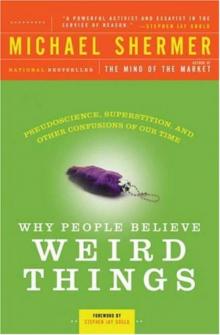Why People Believe Weird Things: Pseudoscience, Superstition, and Other Confusions of Our Time 

Genre: Other9
Published: 2002
View: 3215
Read OnlineRead Why People Believe Weird Things: Pseudoscience, Superstition, and Other Confusions of Our Time Storyline:
SUMMARY:Revised and Expanded Edition. In this age of supposed scientific enlightenment, many people still believe in mind reading, past-life regression theory, New Age hokum, and alien abduction. A no-holds-barred assault on popular superstitions and prejudices, with more than 80,000 copies in print,Why People Believe Weird Thingsdebunks these nonsensical claims and explores the very human reasons people find otherworldly phenomena, conspiracy theories, and cults so appealing. In an entirely new chapter, "WhySmartPeople Believe in Weird Things," Michael Shermer takes on science luminaries like physicist Frank Tippler and others, who hide their spiritual beliefs behind the trappings of science. Shermer, science historian and true crusader, also reveals the more dangerous side of such illogical thinking, including Holocaust denial, the recovered-memory movement, the satanic ritual abuse scare, and other modern crazes.Why People Believe Strange Thingsis an eye-opening resource for the most gullible among us and those who want to protect them. Michael Shermer, Ph. D., is the founding publisher ofSkepticmagazine (www.skeptic.com), the director of the Skeptics Society, the host of the Skeptics Lecture Series at the California Institute of Technology, and a contributing editor and monthly columnist forScientific American.He is the author ofHow We Believe: The Search for God in an Age of Science, Denying HistoryandThe Borderlands of Science. Why do so many people believe in mind reading, past-life regression therapy, abductions by extraterrestrials, and ghosts? What has led to the rise of "scientific creationism" and the belief that the Holocaust never happened? Why, in this age of supposed scientific enlightenment, do people seem to be more impressionable than ever? With a no-holds-barred assault on popular superstitions and prejudices, science historian Michael Shermer debunks these extraordinary claims and explores the very human reasons people find otherworldly phenomena, conspiracy theories, and cults so appealing. But Shermer also reveals the more dangerous side of such thinking, including the recovered memory movement, satanic rituals, modern witch crazes, and ideologies of racial superiority. Shermer concludes by describing his own confrontations with those who take advantage of people's gullibility to advance their own, often self-serving agendas. In a brand-new chapter to this 2002 edition, he explores the trend among major, respected researchers to corrupt the scientific process in support of their own nonscientific belief systems.Why People Believe Strange Thingsis not only an insightful portrait of our immense capacity for self-delusion but, ultimately, a celebration of the scientific spirit. "Brilliant, informed, and incisive dissections of bogus science and history are a major contribution to what one dares hope is a backlash against the still-rising tide of New Age nonsense and public gullibility."Martin Gardner, author ofScience: Good, Bad, and Bogus "For a very soundly documented and reasoned set of specifics, I know of no better single volume than this one. Give it to everyone you know whose head and heart you respect, but who is flirting with irrationality."The Baltimore Sun "Why People Believe Weird Thingsis a tour de force and a literary delight, and it should be required reading for anyone who celebrates intellectual integrity."Frank Sulloway, author ofBorn to Rebel "Brilliant, informed, and incisive dissections of bogus science and history are a major contribution to what one dares hope is a backlash against the still-rising tide of New Age nonsense and public gullibility."Martin Gardner, author ofScience: Good, Bad, and Bogus "This is a book thatPages of Why People Believe Weird Things: Pseudoscience, Superstition, and Other Confusions of Our Time :